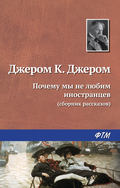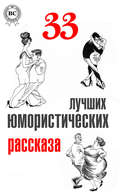
Джером К. Джером
Смешные рассказы / The Funny Stories
4. The end of the editor's story
“He could not understand it, nobody could understand it. His business suffered, and his health grew worse. He seemed to be living upside down[3]. His days didn't have a beginning or end, only the middle. There was no time for exercise or rest. When he began to feel cheerful and sociable[4] everybody was asleep.
One day by chance the explanation came. His eldest daughter was preparing her home studies after dinner.
'What time is it now in New York?' she asked.
'New York,' said her father, 'let me see. It's just ten now, and there's a little over four and a half hours' difference. Oh, about half-past five in the afternoon.'
'Then in Jefferson,' said the mother, 'it is earlier, isn't it?'
'Yes,' replied the girl, 'Jefferson is nearly two degrees further west.'
'Two degrees,' said the father, 'and there's forty minutes to a degree. That would make it now, at the present moment in Jefferson–'
“He jumped up with a cry:
'I've got it!' he shouted, 'I see it.'
'See what?' asked his wife, alarmed.
'It's four o'clock in Jefferson, and just time for my ride. That's what I want!'
There was no doubt about it. For five-and-twenty years he lived by clockwork. But it was by Jefferson clockwork, not London clockwork. He had changed his longitude, but not himself.
He examined the problem and decided that the only solution was for him to return to the order of his old life. He was too formed by habit to adapt himself to circumstances. Circumstances must adapt to him.
He changed his office hours from three till ten. At ten he mounted his horse and went for a canter in the Row, and on very dark nights he carried a lantern. News of it got abroad, and crowds would gather to see him ride past.
He dined at one o'clock in the morning, and after that went to his club. He tried to discover a quiet, respectable club where the members were willing to play whist till four in the morning, but failed and joined a small Soho club, where they taught him poker. The place was occasionally raided by the police, but thanks to his respectable appearance[5], he managed to escape.
At half-past four he returned home, and woke up the family for evening prayers. At five he went to bed and slept like a top[6]. The only thing that really troubled him was loss of spiritual communion. At five o'clock on Sunday afternoons he felt he wanted to go to church, but had to do without it. At seven he ate his simple midday meal. At eleven he had tea and muffins, and at midnight he began to crave for hymns and sermons. At three he had a bread-and-cheese supper, and retired early at four a.m., feeling sad and unsatisfied.
He was a man of habit.”
* * *
We sat in silence.
My friend stood up, took half-a-sovereign from his pocket, put it on the table and went out.
The Ransom of Red Chief
O. Henry
1. A good idea
It looked like a good idea, but wait till I tell you. We were in Alabama – Bill Driscoll and I – when this kidnapping idea came to us. It was, as Bill expressed it later, “during a moment of temporary mental apparition[7]”; but we didn't find that out until later.
There was a town, as flat as a cake, and called Summit.
We had six hundred dollars, and we needed just two thousand dollars more. We talked about it on the front steps of the hotel. They love children a lot in rural communities; because of this and for other reasons, a kidnapping project is better here than in the place where newspapers can send reporters to talk about such things. We knew that Summit couldn't get after us with anything stronger than constables and maybe some bloodhounds and one or two articles in the “Weekly Farmers' Budget”. So, it looked good.
We selected for our victim the only child of a rich citizen named Ebenezer Dorset. The father was respectable. The kid was a boy of ten, with freckles, and hair the color of the cover of the magazine you buy when you are waiting for a train. Bill and I thought that Ebenezer could give a ransom of two thousand dollars. But wait till I tell you.
About two miles from Summit was a little mountain with a cave. We stored provision there. One evening after sundown, we drove past old Dorset's house. The kid was in the street, throwing rocks at a kitten on the opposite fence.
“Hey, little boy!” said Bill, “would you like to have a bag of candies and a nice ride?”
The boy threw a stone into the Bill's eye.
“That will cost the old man an extra five hundred dollars,” says Bill, climbing over the wheel.
We got him down in the bottom of the carriage and drove away. We took him up to the cave. After dark I drove the carriage to the little village, three miles away, where we hired it, and walked back to the mountain.
Bill was putting plaster over the scratches on his face. The boy was watching a pot of boiling coffee, with two feathers stuck in his red hair. He pointed a stick at me when I came up, and said:
“Ha! Paleface, do you dare to enter the camp of Red Chief?”
“We're playing Indians. I'm Old Hank, Red Chief's captive, and he is going to take my scalp!”, said Bill.
Yes, sir, that boy was having fun. He forgot that he was a captive. He called me Snake-eye, the Spy, and announced that when his men returned from the warpath, they were going to burn me at the stake.
Then we had supper; he filled his mouth with bacon and bread, and began to talk. He said something like this:
“I like this. I never camped before; but I had a pet once, and I was nine last birthday. I hate to go to school. Rats ate up sixteen of Jimmy Talbot's aunt's hen's eggs. Are there any real Indians in these woods? I want some more meat. We had five puppies. What makes your nose so red, Hank? My father has lots of money. Are the stars hot? I whipped Ed Walker twice on Saturday. I don't like girls. Do oxen make any noise? Why are oranges round? Have you got beds to sleep on in this cave? Amos Murray has got six toes. A parrot can talk, but a monkey or a fish can't.”
“Red Chief,” I said to the kid, “would you like to go home?”
“Aw, what for?” said he. “I don't have any fun at home. I hate to go to school. I like to camp. You won't take me back home, Snake-eye?”
“Not right now, we'll stay here for a while[8].”
“All right!” said he. “That'll be fine. I never had such fun in all my life.”
We went to bed about eleven o'clock. We lay down on wide blankets and put Red Chief between us. We weren't afraid he'd run away. He kept us awake for three hours, jumping up and screaming. At last, I fell into a troubled sleep, and dreamed that I was kidnapped and chained to a tree by a pirate with red hair.
2. Good morning
In the morning I was awakened by Bill's screams. They weren't yells, or shouts, such as you'd expect from a man – they were simply humiliating screams, such as women make when they see ghosts or caterpillars. It's an awful thing to hear a strong, fat man scream in a cave at daybreak.
I jumped up to see what the matter was. Red Chief was sitting on Bill's chest, with one hand in Bill's hair. In the other he had the sharp knife we used for slicing bacon; and he was really trying to take Bill's scalp.
I got the knife away from the kid and told him to lie down again. But, from that moment, Bill's spirit was broken. I slept for some time, but soon I remembered that Red Chief said he was going to burn me at the stake at the rising of the sun. I wasn't afraid, but I sat up and lit my pipe.
“Why did you get up so early, Sam?” asked Bill.
“Oh, I have got a pain in my shoulder.”
“You're a liar!” says Bill. “You're afraid. He said he will burn you at a stake and you are afraid he'll do it. And he would, if he finds a match. Isn't it awful, Sam? Do you think anybody will pay money to get a little devil like that back home?”
“Sure,” said I. “Now, you and the Chief get up and cook breakfast, and I will go up on the top of this mountain.”
I went up on the peak of the little mountain and looked over the surroundings. I expected to see the dozens of villagers armed with scythes and pitchforks and looking for the kidnappers. But I saw a peaceful landscape with one man ploughing with a mule. “Perhaps,” said I to myself, “they didn't find out that the boy was kidnapped.”
When I got to the cave I found Bill backed up against the side of it, breathing hard, and the boy threatening to smash him with a rock half as big as a coconut.
“He put a hot boiled potato in my pants,” explained Bill, “and then smashed it with his foot; and I boxed his ears[9]. Do you have a gun, Sam?”
I took the rock away from the boy and of calmed them down.
After breakfast the kid takes a piece of leather with strings wrapped around it out of his pocket and goes outside the cave.
“What's he going to do now?” says Bill, anxiously. “You don't think he'll run away, do you, Sam?”
“Do not be afraid,” said I. “He doesn't seem to be a home boy. But we've got to fix up some plan about the ransom. Maybe his father didn't understand that he's gone. His parents may think he's spending the night with Aunt Jane or one of the neighbours. Tonight we must get a message to his father demanding the two thousand dollars ransom for his return.”
Just then we heard a kind of war-cry. It was a sling that Red Chief had pulled out of his pocket, and he was whirling it around his head.
I heard a sigh from Bill, like a horse gives out when you take his saddle off. A rock the size of an egg caught Bill just behind his left ear. He fell in the fire across the frying pan of hot water for washing the dishes. I dragged him out and poured cold water on his head for half an hour.
Bill sits up, touches his ear and says: “Sam, do you know who my favourite Biblical character is?”
“Take it easy[10],” I say.
“King Herod,” says he. “You won't go away and leave me here alone, will you, Sam?”
I went out and caught that boy and shook him until his freckles rattled.
“If you don't behave well,” says I, “I'll take you back home. Now, are you going to be good, or not?”
“I was only kidding,” he says sullenly. “I didn't mean to hurt Old Hank. I'll behave, Snake-eye, if you won't send me home, and if you'll let me play the Black Scout today.”
“I don't know the game,” says I. “That's for you and Mr. Bill to decide. He's your friend for the day. I'm going away on business. Now, you come in and make friends with him and say you are sorry for hurting him, or you will go home.”
I made him and Bill shake hands, and then I took Bill and told him I was going to Poplar Cove, a little village three miles away from the cave.
“I'll be back this afternoon,” said I. “You must keep the boy quiet till I return. And now we'll write the letter to old Dorset.”







